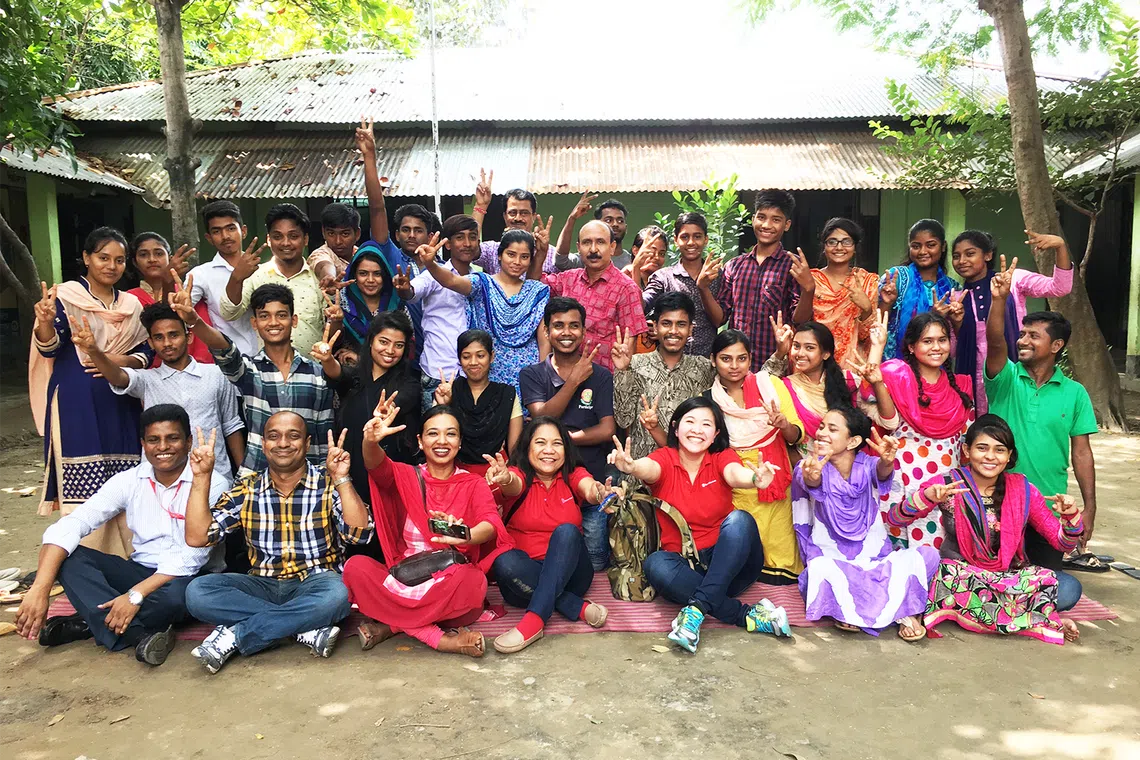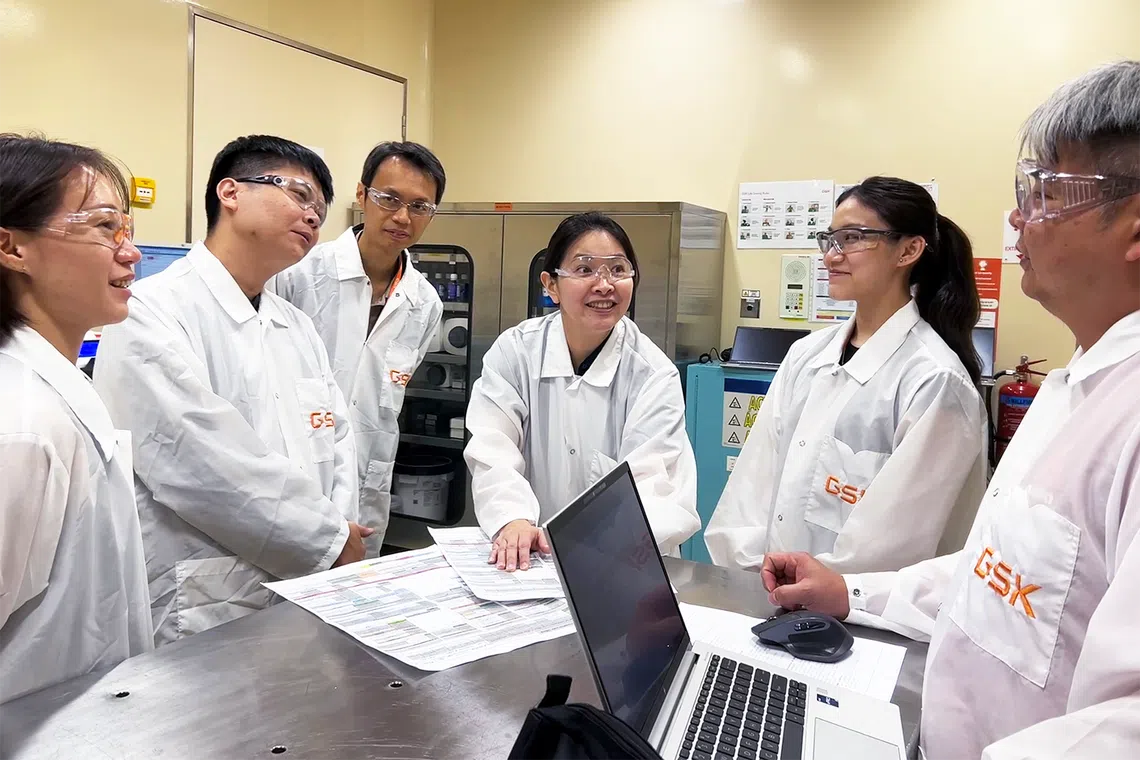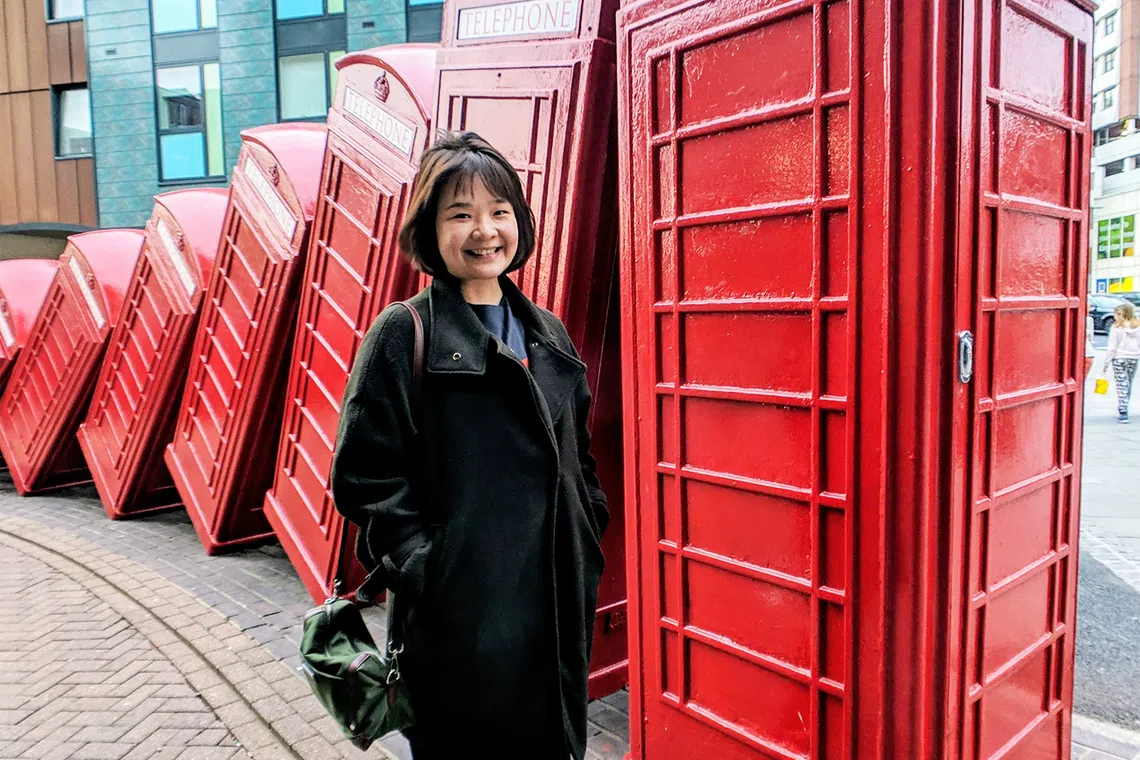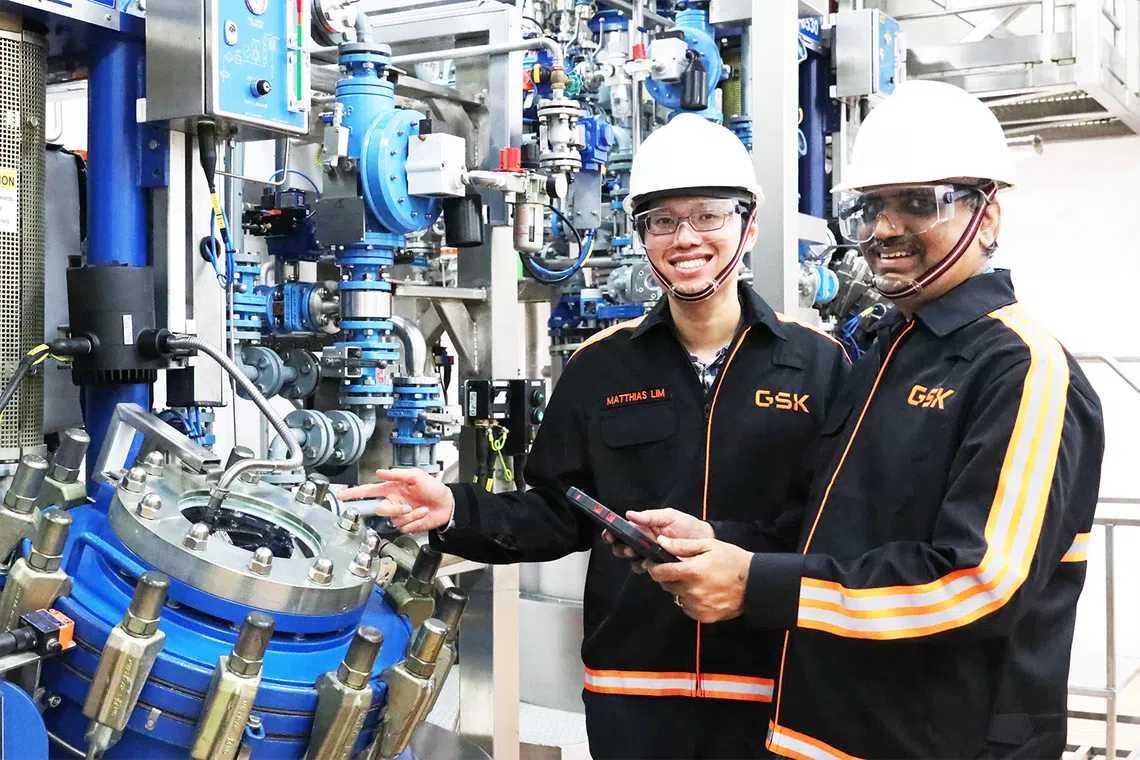BRANDED CONTENT
Time-off to volunteer and opportunities to future-proof career: How biopharma firm honours its employees’ ambitions
At GSK, staff always find support in their pursuits, be it giving back to society, broadening horizons through global exposure or learning a new skill

In 2017, Ms Kelly Kwong (front row, third from right) spent six months in India, Bangladesh and the Philippines, supporting urban development programmes with the full backing of her employer.
PHOTO: GSK
Follow topic:
Imagine hitting pause on your job to volunteer abroad for half a year – that is not the kind of request every workplace is prepared to support. But to Ms Kelly Kwong’s surprise, her employer said yes.
That was how the 42-year-old head of process science joined non-governmental organisation (NGO) Save the Children International in 2017, through a volunteering initiative organised by her employer, biopharma firm GSK. During her time with the NGO, she contributed in helping to strengthen its urban development programmes in India, Bangladesh and the Philippines.
Ms Kwong recalls: “I was sharing with my manager about my goal to volunteer, but I had several projects on my plate and it was not a good time.
“He said something that I would always remember: ‘There is never a good time. If you want it, you do it – I will fully support you’.” Ms Kwong did not have to take no-pay leave – in fact, she continued to receive her full salary during the six-month-long volunteering period.
GSK’s volunteering programme has been recently updated and now includes flexible and shorter duration options rather than a full six months, allowing more employees to volunteer based on their expertise and technical skills. This also expands the range of NGOs that GSK can support.
Personalised career development
Ms Kwong’s volunteering stint was made possible through GSK’s Differentiated Development Plan, which supports employees in pursuing growth opportunities beyond their day-to-day roles.
Each employee at GSK has a personalised career development plan that states their goals and aspirations, both personal and professional. The company is one of Singapore’s best 250 employers list compiled by global research firm Statista in collaboration with The Straits Times
GSK employs over 1,500 people in Singapore and is one of the biggest contributors to the country’s biomedical sciences industry, with local investments of more than $2.5 billion. The firm focuses on four core therapeutic areas: respiratory, immunology and inflammation, oncology, human immunodeficiency virus and infectious diseases.
“We encourage employees to participate in collaborative projects, job rotations and cross-functional teams so they can gain diverse experiences,” says Ms Kwong, who leads a team of nine.
For example, managers can attend a mentoring group called “Leaders Lab”. New managers can share the challenges they face at work and receive advice from experienced senior managers. “Even though I am mentoring, sometimes I also benefit from listening to others,” she says.

Ms Kwong (third from right) and her team of scientists explore and implement digital twin technology and advanced monitoring methods, such as Process Analytical Technology (PAT), to improve production efficiency and optimise processes.
PHOTO: GSK
Giving back through meaningful work
For Ms Kwong, working in a company is not just about collecting a pay cheque, but also believing in its mission and purpose. To that end, GSK’s purpose of “uniting science, technology and talent to get ahead of disease together” resonates with her.
Through its vaccine supply programme, GSK has provided 672 million doses of its products to low-income countries at reduced prices, as part of its efforts to improve healthcare access in underserved communities.
This includes 45 million doses of GSK’s pneumococcal vaccine which is manufactured in Singapore. Says Ms Kwong: “GSK has consistently been a leader in the Access to Medicine Index, ranking first or second since 2008, and I think that reflects the company’s ongoing efforts to improve access to medicines in low- and middle-income countries.”
Ms Kwong also feels proud of GSK’s focus on sustainability. “Since the start of this year, our manufacturing sites in Singapore have been running on renewable electricity through Sembcorp’s solar projects,” she explains.
She shares a strong connection with these efforts. “GSK’s social responsibility mission is aligned with my own values. This is why I’ve stayed here for 14 years,” she says. “Being able to give my time and experience to help others with GSK’s support allows me to contribute to what truly matters. It’s incredible to think I’ve played a small part in helping children pursue their dreams.”
Opportunities to broaden horizons
Another employee who has benefited from the opportunities and support provided by GSK is Ms Elvina Wee. Like Ms Kwong, she found herself presented with unexpected opportunities during her time at the company – ones that would shape her career and open doors to new experiences abroad.
In 2012, just two years into her job as a brand manager at GSK, Ms Elvina Wee was asked to consider a 12-month assignment in Kuala Lumpur. Although she was initially apprehensive, she took the plunge.
It ended up becoming an eye-opening experience. “I learnt to navigate the complexities of a different market, adapt to new business practices and build strong relationships with local colleagues and stakeholders.”
In 2019, another opportunity came knocking – this time, a move to GSK’s global hub in London. After her positive experience in Kuala Lumpur, Ms Wee did not hesitate: “I was like, yes, why not?”
The eight months in the UK further advanced Ms Wee’s professional development. “Working in a global hub, I was exposed to cutting-edge science and technology, and had the opportunity to collaborate with some of the brightest minds in the industry.
“This experience honed my strategic thinking and leadership abilities, enabling me to contribute more effectively to GSK’s mission.”

Ms Elvina Wee during her eight-month-long overseas assignment in London in 2019.
PHOTO: GSK
The 41-year-old has now been with GSK for almost 15 years – and for good reason. “The exposure I get within GSK is phenomenal. I don’t really feel a need to move, because there are always opportunities available internally, and I am fortunate to get to change roles and be exposed to different parts of the business,” says Ms Wee, who is now a senior product manager.
During her time at GSK, she has managed a diverse range of products in consumer healthcare and pharmaceuticals. Today, her portfolio includes vaccines.
Currently, Ms Wee is based at GSK’s regional hub in Rochester Park, which hosts the company’s Global General Medicines business as well as its operations for the Emerging Markets and the Greater China and Intercontinental regions, and local Singapore business. “One thing I’ve realised is that when the opportunity is scary, it means it’s a good move. When you’re comfortable, you’re not challenging yourself,” she says.
Pivoting to smart manufacturing
Sometimes, a career shift begins with the courage to ask for a new role.
In 2018, Mr Matthias Lim, then a senior production engineer at GSK, did that.
He asked his manager if he could deepen his knowledge in data analytics, and the timing was right.
The company’s Jurong site had just embarked on its digitalisation, data analytics and advanced manufacturing journey to explore the application of technology to accelerate data driven insights and improve manufacturing processes.
The plant in Jurong is a leading new product introduction site within GSK’s global supply chain, focused on developing late-phase new chemical entities and producing new innovative medicines in areas such as infectious diseases and oncology.
Mr Lim, now 36, went through an intensive six-week data analytics training with external consultants. “I am grateful for GSK’s commitment to invest in my development and help me gain new insights in digitalisation.”
He is currently a digital data analytics manager at GSK’s Jurong site, which is pioneering the company’s global smart manufacturing ambition to innovatively use automation and digital solutions to deliver new medicines and vaccines to patients across the world in a reliable, effective and sustainable manner.

Mr Matthias Lim (left) and Mr Narayanan Narasa at GSK’s manufacturing site where they apply data analytics to improve production processes.
PHOTO: GSK
Another GSK employee who was supported in his mid-career pivot is Mr Narayanan Narasa, who was a senior tech developer but wanted to move into smart manufacturing. “I was given exposure to the production process via managing manufacturing applications,” says the 56-year-old.
Together, both men are using their newfound knowledge to make GSK’s manufacturing processes smarter, more effective and more resilient for patients worldwide.
The improved efficiency of smart manufacturing also has downstream benefits for patients. Says Mr Narayanan: “I know that I’m making a difference because we are using technology to deliver quality medicines more efficiently, helping patients and their caregivers better manage medical conditions.”
Read more about Singapore’s Best Employers 2025.


